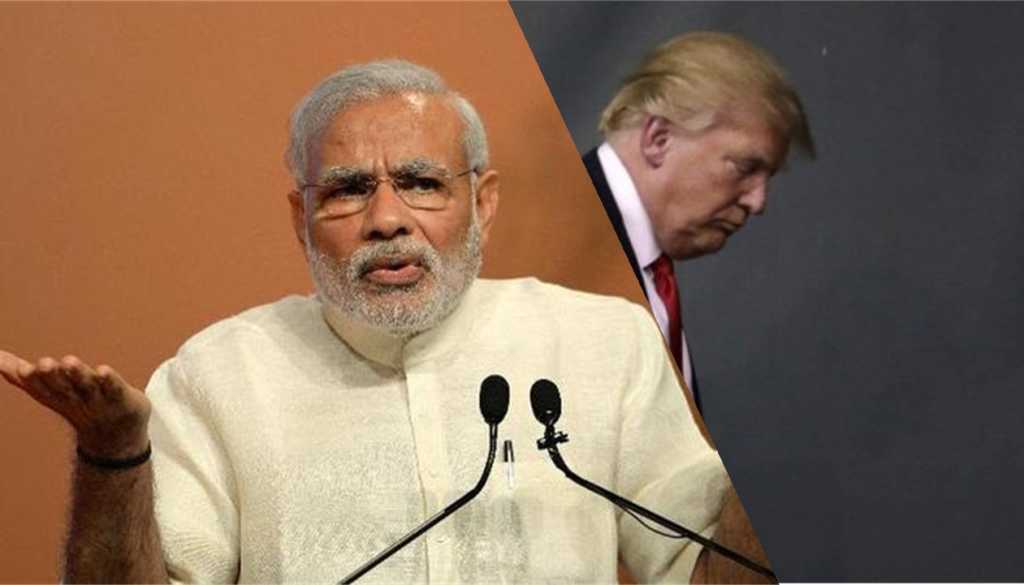In a bold step which indicates how India is emerging as a global superpower which is going to play an independent role in international relations, it is set to launch retaliatory tariffs worth $240 million next week on a revised list of 30 items imported from the United States. This has been done in order to confront the Trump administration on the American move to suddenly hike duties on Indian steel and Aluminium. The move comes at a time when India has decided to hold trade negotiations with the US in order to ease the growing tensions between the two countries on this specific issue.
In order to take on the unilateral hike in duties by the United States, India has notified a revised list of 30 items imported from the US to the World Trade Organisation (WTO) which includes significant products like apples, almonds, phosphoric acid and motorcycles with engine capacity of more than 800 cc (including Harley Davidson motorbikes) on which it seeks to impose retaliatory tariffs. Earlier, on May 18 this year India had notified a list of 20 items imported from the US worth $166 million on which it sought to levy tariffs. However, in the new list India has brought down additional duties on walnuts and Harley-Davidson.
In its communication to the WTO, it has stated, “India hereby reiterates its decision to suspend concessions or other obligations notified to the Council for Trade in Goods on May 18, 2018…of the General Agreement on Tariffs and Trade 1994 and Article 8.2 of the Agreement on Safeguards, that are substantially equivalent to the amount of trade affected by the measures imposed by the United States”. Thus, it has been made clear that the proposed hike in tariffs is not any ordinary measure but in the form of retaliatory tariffs.
India had requested the US to exempt it from 25% levy on steel and 10% on aluminium which was put in place by the Trump dispensation on the grounds of national security. However, this request was turned down by the US. India has however responded in the most prompt and effective manner possible. It has not only proposed retaliatory tariffs that must have caught the US off guard but has also dragged the US to the WTO dispute settlement mechanism over the arbitrary and unreasonable hike in duties by the US.
Trump has been seen wrangling with his allies by taking a hard line on the issue of trade tariffs. Trade friction with the US has not been exclusive to India. On Friday, Trump had announced trade tariffs on $50 billion of Chinese imports and the dragon threatened to respond to the measure with “equal scale, equal intensity.” Similarly, in Brussels, the European Union seems to be in a tussle on trade tariffs with the US. On Thursday, it imposed tariffs directly targeting US products such as whiskey, blue jeans and motorcycles in retaliation against duties imposed by Trump on European metals. The European Union imposed countermeasures to the tune of 2.8 billion Euros of American imports.
India has also responded to Trump’s trade wars like an emerging economic superpower must respond. Just like the European Union, India has retaliated to trade friction created unilaterally by the US in equal measure. The US has been looking upon India as a crucial strategic partner for quite some time and there is no doubt about the fact that India has always responded with warmth to any goodwill measures extended by the US. However, with this move India has made it clear that notwithstanding the strategic relationship with the United States, it is not going to take unilateral hikes by the US lying down. India will retaliate to any adverse measures taken by the United States with full intensity and vigour. India has made its intention clear, in the run up to Assistant United States trade representative Mark Linscott’s visit to India in the last week of June during which he is set to negotiate a “trade package”. With the retaliatory tariffs being imposed by India, it is clear that the negotiations will take place from an equal level as India will have the option of using proposed hikes as bargaining chips. This must also be taken as India’s arrival in the international arena as an economic superpower.
